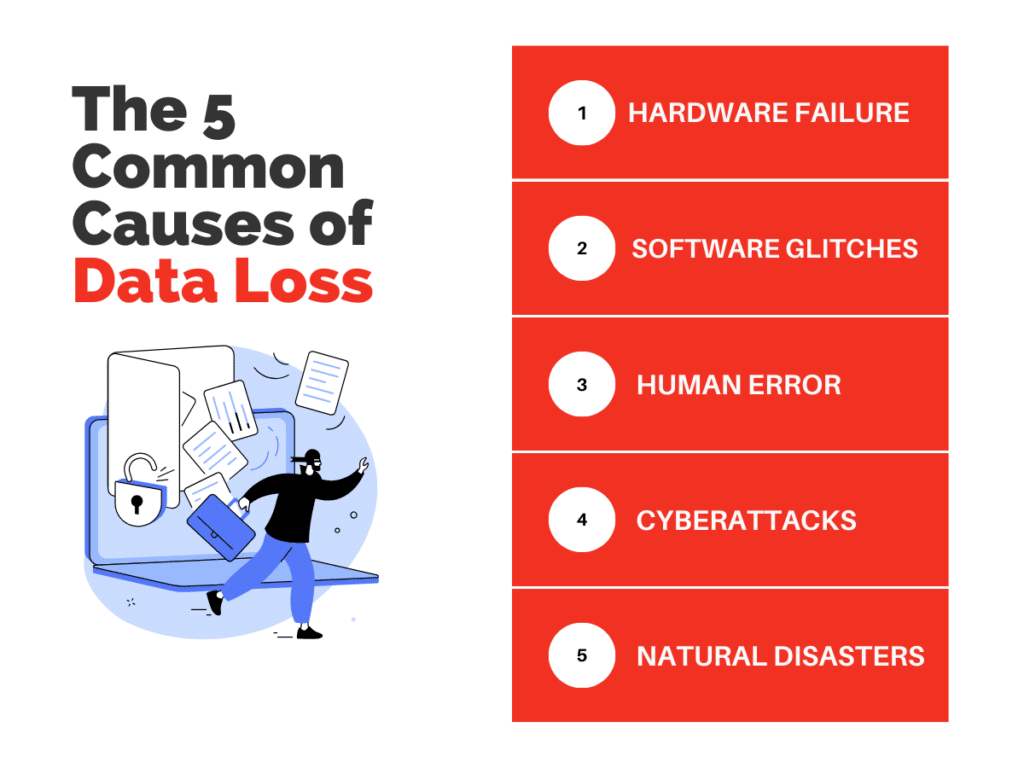In today’s digital age, where businesses rely heavily on data to operate efficiently, ensuring the safety and availability of your critical information is paramount. Data loss can disrupt operations, tarnish your reputation, and even lead to financial losses. That’s where data backup and recovery come into play.
In this blog, we’ll explore the importance of data backup and recovery for business decision makers and provide valuable insights into securing your vital information.
What is Data Backup and Recovery
Data backup and recovery is a crucial component of any modern business’s IT strategy. It involves creating copies of your important data and systems and storing them in a secure location to prevent loss due to unforeseen events like hardware failures, natural disasters, cyberattacks, or human errors. When data is lost, compromised, or corrupted, recovery procedures are used to restore it to its original state.
Why Data Backup Matters
The State of Disaster Recovery in 2023 report found that only 30% of businesses have a disaster recovery plan in place, and only 20% of businesses test their backups regularly.
Picture this: Your office server crashes, and with it, your client files, financial records, and that hilarious cat meme collection you’ve been curating for years—gone. The result? Chaos, lost business, and an abundance of stress. Computers can be notoriously unpredictable, succumbing to crashes, viruses, or accidental file deletions. Without a backup, those precious files might as well be lost in a digital abyss. But with data backup, you can breathe easy, knowing your digital treasures are safe and sound.
1. Business Continuity
Data backup ensures business continuity by minimizing downtime in the face of data loss. With a reliable backup solution in place, you can swiftly recover and resume normal operations, dramatically reducing disruptions and financial losses.
2. Reputation Management
Data breaches and data loss incidents can cast a dark shadow over your company’s reputation. Your customers and partners entrust you with their data, and a robust backup and recovery strategy is a testament to your commitment to security and reliability.
3. Regulatory Compliance
Many industries operate under strict data protection regulations, and data backup is your passport to compliance. By ensuring data availability and security, you dodge hefty fines and legal consequences that non-compliance may entail.
The Impact of Data Loss on Your Business
The consequences of data loss extend far beyond the immediate. They encompass lost revenue and productivity, legal repercussions, damage to your reputation, the loss of valuable intellectual property, operational chaos, and a gradual erosion of customer trust.
Perhaps the most palpable consequence is the financial toll. Lost revenue doesn’t merely encompass the direct costs of data recovery, it also factors in the opportunity cost of disrupted operations. When critical data becomes inaccessible, workflows grind to a halt, employee productivity nosedives, and revenue-generating activities come to a screeching halt. Even a brief interruption in operations can translate into significant financial losses.
Common Causes of Data Loss
Understanding the culprits behind data loss is pivotal in crafting a robust backup and recovery strategy. The primary suspects include:
- Hardware Failure: Hard drives, servers, and storage devices have a knack for failing unexpectedly, often leading to data loss.
- Human Error: Accidental data deletion or overwriting is a frequent offender in business settings.
- Cyberattacks: Ransomware, malware, and phishing attacks can compromise data security and availability.
- Natural Disasters: Fires, floods, earthquakes, and other disasters can wreak havoc, destroying both physical infrastructure and on-site data.
- Software Glitches: Software bugs or crashes can corrupt or erase data in the blink of an eye.

What to Prioritize in Data Backup
Not all data is equal in importance. Within your digital realm, some data stands out as undeniably more critical than the rest. These data gems deserve special attention and should be protected through comprehensive backup strategies. When considering what to prioritize, focus on:
- Customer and Financial Data: Think customer records, transaction history, and financial statements.
- Intellectual Property: Guard your proprietary information, such as patents, product designs, and trade secrets.
- Operational Data: Secure essential operational data like inventory, supply chain information, and employee records.
- Legal and Compliance Data: Keep records necessary for regulatory compliance and legal purposes in your protective custody.
Types of Data Backup
Choosing the right data backup method isn’t a one-size-fits-all endeavor. Your decision should align with your budget, recovery time objectives (RTOs), data volume, security concerns, automation capabilities, and scalability. Often, organizations opt for a combination of backup methods to effectively safeguard their data landscape. Here are some options:
- Full Backups: The comprehensive approach involves creating complete data copies at specific points in time.
- Incremental Backups: These focus solely on capturing changes made since the last backup, offering efficiency.
- Differential Backups: A middle ground, they capture all changes since the last full backup, simplifying restoration compared to incremental backups.
- Cloud Backup: Rising in popularity, this method stores data on secure off-site servers managed by third-party providers. It offers scalability, accessibility, and reduced reliance on on-site infrastructure.
Additional Tips for Data Backup:
- Regularly test your backup and recovery processes to ensure they perform as expected.
- Educate your employees about the significance of data security and responsible data handling.
- Keep your backup copies in secure, off-site locations to guard against physical disasters.
Get Started on Your Backup Plan
Data backup and recovery are the unsung heroes of modern business IT strategies. They ensure business continuity, preserve your hard-earned reputation, and keep you on the right side of the law. By understanding the common causes of data loss, prioritizing your crown jewel data, and selecting the right backup solutions, you can fortify your organization against the potentially devastating consequences of data loss. Your digital treasure trove is worth protecting. Never underestimate the power of a solid backup plan.
Make Things Easy By Partnering with a Managed IT Services Provider
Collaborating with a Managed IT Services Provider (MSP) isn’t just about convenience. It’s a strategic move that supercharges your data protection efforts across key areas. MSPs craft tailored data protection plans, conduct assessments, and expertly execute strategies that align with your goals and budget. Remember, you don’t have to navigate the data backup maze alone. As always, reach out to us with any questions.

